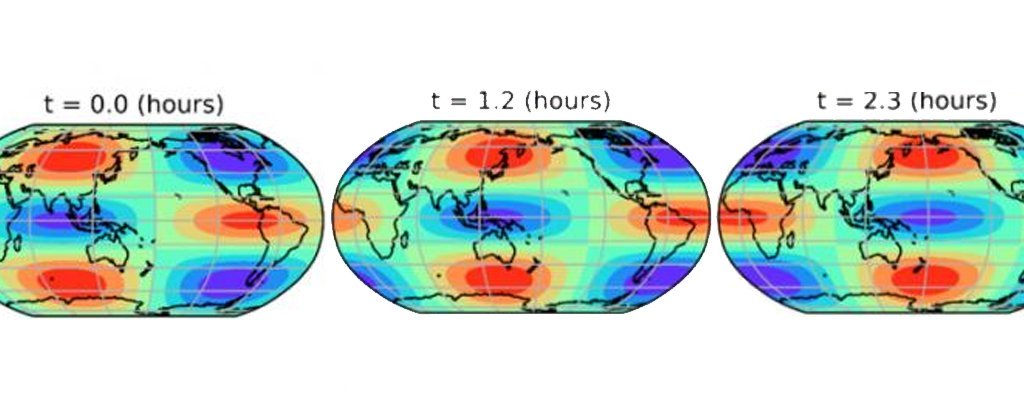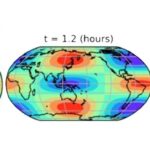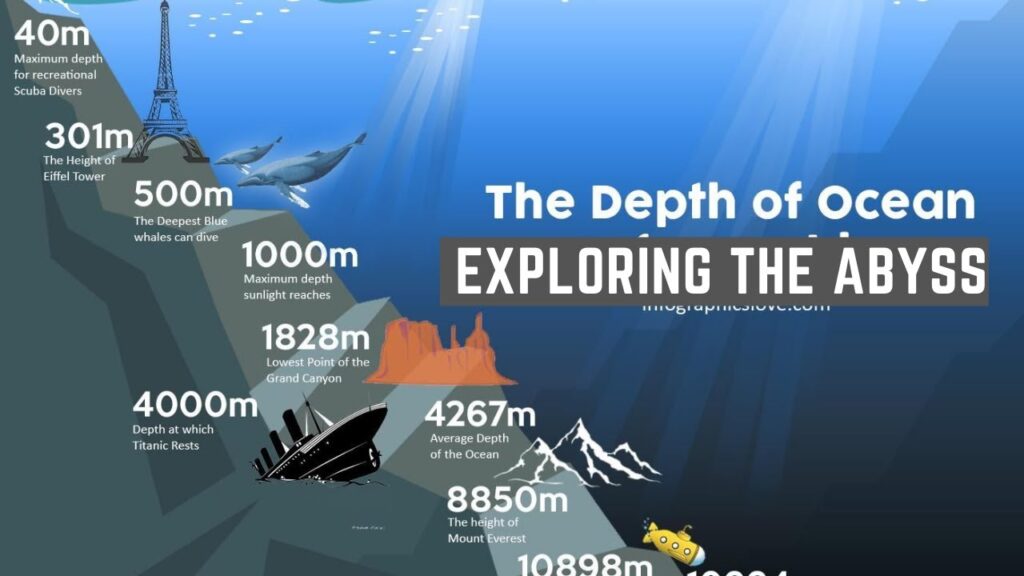Just as the Moon tugs at our planet’s seas, contributing to oceanic tidal waves, it also pulls at our atmosphere along with the Sun, creating waves in the sky.
A new study now demonstrates how some types of ‘sky waves’ resonate around Earth, much like how sound waves resonate inside a bell.

In the water, waves are produced by passing energy. Energy moving through our skies – from things like heat-produced pressure to the gravitational pull of celestial bodies – also creates waves.
These atmospheric waves don’t slosh around the same way ocean waves do, but they are still recognisable if one knows what to look for: moving pockets of more tightly packed air, thousands of kilometres long.
Previous studies have focussed on localised spaces and limited time scales, allowing detection of sky waves between 1,000 to 10,000 km (600 to 6,000 miles) across, with a wave frequency of several hours. But recently available data have now opened up a much wider global view.
The ERA5 dataset, released by the European Centre for Medium-Range Weather Forecasts (ECMWF), provides hourly estimates of many global atmospheric, land, and ocean climate variables within five days of real time. It also contains masses of re-analysed historical observations of these measurements, extending the dataset all the way back to 1979.
This allowed Takatoshi Sakazaki from Kyoto University and atmospheric scientist Kevin Hamilton from the University of Hawaii to explore atmospheric pressure data across 38 years, including sky waves with frequencies between 2 hours to 2 days, and wavelengths greater than 5,000 km (3,000 miles).
At this scale, the researchers could observe previously detected lunar and solar atmospheric waves, along with something else: “randomly excited global-scale resonant modes”, first predicted in the 19th century by famous French physicist Pierre-Simon Laplace.
If the waves travel through the air at the right height and speed, they can become in tune with the atmosphere, creating resonance. This allows the waves to form a pattern stable enough to vibrate across the entire global atmosphere, like sound waves ringing through a bell.
And indeed, the researchers found sets of these resonating sky waves (resonant modes) that spanned the entire globe contributing tonal layers to the atmosphere’s bell-like ringing. This includes multiple resonant modes circling tropical regions.
“Our identification of so many modes in real data shows that the atmosphere is indeed ringing like a bell,” said Hamilton.
The team identified some of the wave sets as Rossby waves powered by inertia and others Kelvin waves. Some of them move eastwards, others westwards, and some exceeded a staggering speed of 1,080 km/hr (700 mph).
The team also detected a small difference between observed and predicted frequencies of these resonating waves, which they concluded is caused by a Doppler shift – when travelling waves push closer to each other in their direction of travel, thus increasing in frequency. This mainly moves in an eastward direction.
Details like these can now be taken into account in atmospheric models to make them more accurate.
“For these rapidly moving wave modes, our observed frequencies and global patterns match those theoretically predicted very well,” explained Sakazaki.
“It is exciting to see the vision of Laplace and other pioneering physicists so completely validated after two centuries.”
The confirmation of these theories of atmospheric circulation and subsequent fine-tuning will allow scientists to make more robust climate and weather prediction models.
But there is still a lot to work out; the researchers are now planning to investigate the processes that excite and muffle these newly confirmed atmospheric chimes.








 Photographer Finds Locations Of 1960s Postcards To See How They Look Today, And The Difference Is Unbelievable
Photographer Finds Locations Of 1960s Postcards To See How They Look Today, And The Difference Is Unbelievable  Hij zet 3 IKEA kastjes tegen elkaar aan en maakt dit voor zijn vrouw…Wat een gaaf resultaat!!
Hij zet 3 IKEA kastjes tegen elkaar aan en maakt dit voor zijn vrouw…Wat een gaaf resultaat!!  Scientists Discover 512-Year-Old Shark, Which Would Be The Oldest Living Vertebrate On The Planet
Scientists Discover 512-Year-Old Shark, Which Would Be The Oldest Living Vertebrate On The Planet  Hus til salg er kun 22 kvadratmeter – men vent til du ser det indvendigt
Hus til salg er kun 22 kvadratmeter – men vent til du ser det indvendigt  Superknepet – så blir snuskiga ugnsformen som ny igen!
Superknepet – så blir snuskiga ugnsformen som ny igen!  Meteorite That Recently Fell in Somalia Turns Out to Contain Two Minerals Never Before Seen on Earth
Meteorite That Recently Fell in Somalia Turns Out to Contain Two Minerals Never Before Seen on Earth  Nearly Frozen Waves Captured On Camera By Nantucket Photographer
Nearly Frozen Waves Captured On Camera By Nantucket Photographer  It’s Official: Astronomers Have Discovered another Earth
It’s Official: Astronomers Have Discovered another Earth 